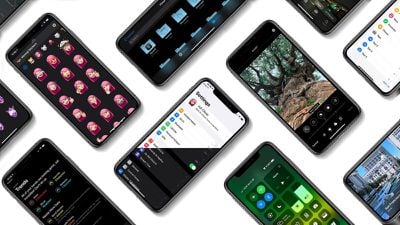Apple Releases iOS and iPadOS 13.1.1 With Siri and Battery Drain Fix, Keyboard Vulnerability Update and More
Apple today released iOS and iPadOS 13.1.1, updates to the iOS and iPadOS 13.1 software that was released on Tuesday.
The iOS and iPadOS 13.1 updates are available on all eligible devices over-the-air in the Settings app. To access the updates, go to Settings > General > Software Update.

iOS and iPadOS 13.1.1 are minor updates that focus on bug fixes and performance improvements rather than major outward-facing changes. It addresses a third-party keyboard vulnerability, for example, which Apple outlined earlier this week. According to Apple's release notes, the iOS 13.1.1 update addresses the following bugs:
- Fixes issues that could prevent iPhone restoring from backup
- Addresses an issue that could cause battery to drain more quickly
- Fixes an issue that could impact recognition of Siri requests on iPhone 11, iPhone 11 Pro and iPhone 11 Pro Max
- Resolves a problem where Safari search suggestions may re-enable after turning them off
- Addresses an issue that could cause Reminders to sync slowly
- Fixes a security issue for third-party keyboard apps
There are also separate release notes for the iPad, but the update addresses the same issues:
- Fixes issues that could prevent iPad restoring from backup
- Addresses an issue that could cause battery to drain more quickly
- Resolves a problem where Safari search suggestions may re-enable after turning them off
- Addresses an issue that could cause Reminders to sync slowly
- Fixes a security issue for third-party keyboard apps
iOS 13.1.1 could soon be followed up by iOS 13.2, an update that's already been spotted in analytics and could be released in a beta capacity in the coming weeks.
The prior iOS 13.1 update introduced Share ETA, expanded audio sharing options, Shortcuts Automations, directional AirDrop on new iPhones, and more. For additional info on what's new in iOS 13, make sure to check out our roundup.
Popular Stories
A new report from The Information today reveals much of the internal turmoil behind Apple Intelligence's revamped version of Siri.
Apple apparently weighed up multiple options for the backend of Apple Intelligence. One initial idea was to build both small and large language models, dubbed "Mini Mouse" and "Mighty Mouse," to run locally on iPhones and in the cloud, respectively. Siri's...
Apple may have updated several iPads and Macs late last year and early this year, but there are still multiple new devices that we're looking forward to seeing in 2025. Most will come in September or October, but there could be a few surprises before then.
We've rounded up a list of everything that we're still waiting to see from Apple in 2025.
iPhone 17, 17 Air, and 17 Pro - We get...
Apple in October 2024 overhauled its 14-inch and 16-inch MacBook Pro models, adding M4, M4 Pro, and M4 Max chips, Thunderbolt 5 ports on higher-end models, display changes, and more. That's quite a lot of updates in one go, but if you think this means a further major refresh for the MacBook Pro is now several years away, think again.
Bloomberg's Mark Gurman has said he expects only a small...
On this week's episode of The MacRumors Show, we catch up on the latest iOS 19 and watchOS 12 rumors, upcoming devices, and more.
Subscribe to The MacRumors Show YouTube channel for more videos
Detailed new renders from leaker Jon Prosser claim to provide the best look yet at the complete redesign rumored to arrive in iOS 19, showing more rounded elements, lighting effects, translucency, and...
YouTube channel Front Page Tech is back today with another video that provides a closer look at iOS 19's alleged design changes.
The video contains re-created renders of iOS 19, which are allegedly based on real footage of the software update, provided by sources within Apple. Overall, iOS 19 is expected to have a more glass-like, visionOS-inspired design, with added translucency for user...
While the iPhone 17 Pro and iPhone 17 Pro Max are not expected to launch until September, there are already plenty of rumors about the devices.
Below, we recap key changes rumored for the iPhone 17 Pro models as of April 2025:
Aluminum frame: iPhone 17 Pro models are rumored to have an aluminum frame, whereas the iPhone 15 Pro and iPhone 16 Pro models have a titanium frame, and the iPhone ...
Apple will be permanently closing its store at the Northbrook Court shopping mall in the Chicago suburb of Northbrook on April 26, the company has announced.
Apple has added the following notice to the store's web page:Thank you Northbook. Apple Northbrook is closing on April 26 at 7pm. We're still here for you. Please visit apple.com/retail to find your nearest store.Apple Northbrook opened ...
Apple released the first beta of iOS 18.5 last week, and so far the software update includes only two minor changes.
The changes are in the Mail and Settings apps.
In the Mail app, you can now easily turn off contact photos directly within the app, by tapping on the circle with three dots in the top-right corner.
In the Settings app, there is some new AppleCare+ information.
For ...
Apple's current struggles with Apple Intelligence and Siri began in early 2023 when AI head John Giannandrea sought approval from CEO Tim Cook to purchase more AI chips for development, according to a new report from The New York Times.
Cook initially approved doubling the team's chip budget, but CFO Luca Maestri reportedly reduced the increase to less than half that amount, and instead...























